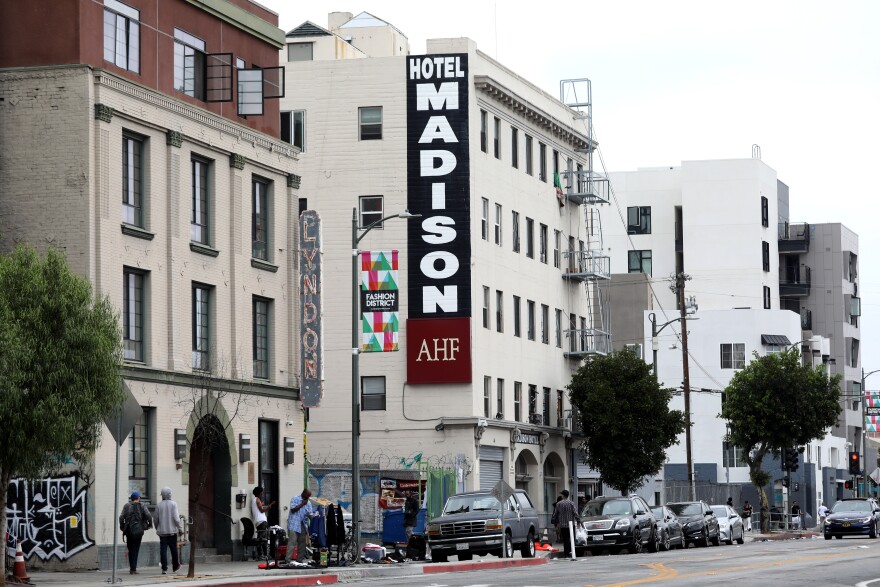
The AIDS Healthcare Foundation is located on the 21 floor of the Sunset Media Center, which is described as Hollywood’s most innovative vertical office campus. AHF makes about $2 billion in revenue per year and has spent millions lobbying to pass Prop. 33.
By ANGELA MCGREGOR
On the face of it, there would seem to be little in common between Proposition 33 – which would do away with a 30-year-old, statewide rent control law in favor of local control over rent regulation – and Proposition 34 – which would allow the state to negotiate lower Medi-Cal drug prices. But in fact, the two measures are inextricably joined.
And the glue that holds them together is a nonprofit AIDS Healthcare Foundation.
AHF was founded in 1987 with the stated goal of ending the AIDS epidemic. In the 1990s, as advancements in medical treatment for AIDS progressed, the organization’s focus evolved from providing hospice care for patients to distributing medical care for patients. Because AHF is able to charge government insurance programs more than it pays for drugs, through a federal program known as 340B, the organization generates about $2 billion in revenue per year.
AHF has spent millions on funding the campaign to pass Proposition 33, the so-called “Justice for Renters” Act. While ads for the proposition refer to it as “pro rent control,” in fact, the only thing this proposition would do if passed would be to overturn California’s existing, state-wide rent control legislation – a measure passed in 1995 called the Costa-Hawkins Act.
Costa-Hawkins exempts units built before 1995 from rent control, and allows landlords to reset rents when units become vacant. The Act also exempts condos, single-family homes, and new construction from rent control. At the time it was passed, it was seen as a way to pull back on overly restrictive municipal rent control legislation while still allowing cities to protect tenants and leave in place financial incentives for new construction of rental properties.
Proposition 33 is the third ballot measure since 2017 calling for the repeal of Costa-Hawkins, all of which have been bankrolled by AHF. According to critics, AHF spends a disproportionate share of their excess revenue on political lobbying (for a nonprofit).
Critics of the proposition argue that it would ultimately discourage development by opening the door to onerous rent control restrictions that would effectively eliminate the profit motive for developing multi-family housing. For example, municipalities opposed to development but under pressure to create more housing could adopt rent control policies so restrictive that no one would want to build there.
In addition, AHF has also spent millions of dollars on the purchase of more than a dozen single-room occupancy apartment buildings in Los Angeles, which charge rents as low as $400 per month. According to its website, these buildings are being “built” by one of AHF’s spin-off 503c’s, The Healthy Housing Foundation, and “provide decent housing units at an affordable cost”. However, they are not listed on that organization’s 2022 income tax returns (nor that of AHF).
According to a November 2023 report by the LA Times, many of AHF’s 1300 tenants are living in squalid, unsafe conditions, including “one tenant’s dog [who] was scalded to death after a radiator exploded…[and] a legally blind tenant who fell more than 12 feet down an open elevator shaft.
When some of these tenants withheld rent to pressure AHF to make repairs, they were evicted and, in some cases, had their belongings confiscated. This would appear to contradict the positions taken by an initiative that was created and funded by AHF called “Housing is a Human Right,” which lobbied for an eviction moratorium during the pandemic and has relentlessly lobbied against Ellis Act evictions.
In September, AHF settled a lawsuit with tenants of one of their properties, the Madison, located at 423 East 7th Street, near Skid Row, agreeing to pay $575,000 to the plaintiffs and address insect infestations, broken elevators, and other issues.
In return, tenants were required to “acknowledge that AHF has invested significant resources into improving and upgrading the Madison, which represents an effort to improve the conditions in L.A.’s Skid Row district.” Although AHF told the L.A. Times that, since 2017, they had spent $7 million to upgrade the Madison, a search of LA’s Building and Safety website could find no permits issued for work at that address.
Proposition 34 would restrict the activities of healthcare entities licensed in California who participate in the 340b program, and have spent more than $100 million on purposes other than direct patient care over the past ten years. In other words, it would mandate that AHF spend at least 98% of its revenue on direct patient healthcare. And according to its 2022 income tax statement, AHF spends over $250 million a year on employee benefits and wages – more than 8% of its total revenue – alone.
Since AHF is the only organization that fits the description of one that would be regulated by Proposition 34, it’s not surprising that their campaign against it has deemed it a “revenge initiative” by the California Apartment Association, one of the major donors to the No on Prop 33 campaign. However, CAA is not the measure’s only proponent; it includes a wide variety of patient advocacy groups (including the ALS Association and the California Chronic Care Coalition).
The argument for Proposition 33 comes down to whether one attributes L.A.’s current rent affordability crisis to landlord excesses enabled by Costa-Hawkins, or to a shortage of available units.
As for Proposition 34, voters must decide whether AHF’s expenditures constitute permissible advocacy on behalf of AIDS patients or an abuse of its status as a nonprofit and the federal program that has filled its coffers.
According to recent polling, both measures are currently slightly ahead, creating the distinct possibility that AHF could wind up finally winning the battle to overturn Costa-Hawkins, while also losing its ability to continue to be a major political player in state government.
The LA Daily News summed up Prop. 33 & 34 on their October 15 Opinion Page:
No on proposition 33: Rent control doesn’t work and it never will.
Yes on Proposition 34: The AIDS HealthCare Foundation has abused our democratic system and must be stopped.
(Editor’s note: This story first appeared in the Westside Current and is reprinted with permission.)


Rent control doesn’t work for landlords…..
BTW, I’d have just torn the sign off the dumpster and taken it away.
The post was very good, I appreciate how you explain it, Keep the posts coming! Very good talent.
No on proposition 33: Rent control doesn’t work and it never will.
But Michael as kicked all of us off Nextdoor who do not agree with
His politics
Nasty person